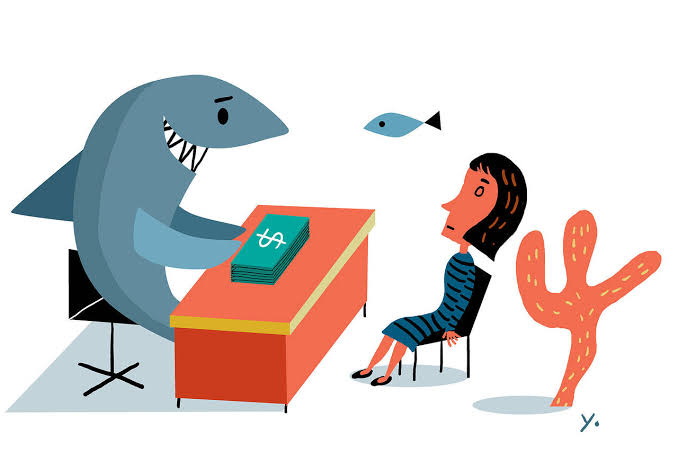The phenomenon of loan sharks in Nigeria has escalated into a significant issue, with numerous reports of harassment, defamation, and even suicide linked to these predatory lenders. Loan sharks exploit desperate individuals with exorbitant interest rates, often leading to a cycle of debt that is difficult to escape. This article aims to shed light on the activities of loan sharks, the impact on victims, and practical steps Nigerians can take to protect themselves.
The Modus Operandi of Loan Sharks
Loan sharks in Nigeria typically operate through digital lending platforms, which have proliferated in recent years due to the convenience and speed of online loans. These platforms promise quick cash with minimal documentation, attracting individuals in urgent need of funds. However, the ease of access is a trap; the terms are often misleading, and interest rates are exorbitantly high.
Common Practices of Loan Sharks:
- High Interest Rates and Hidden Charges: Many loan apps advertise low-interest rates but hide numerous charges that inflate the repayment amount.
- Short Repayment Periods: Borrowers are given very short periods, sometimes as short as a week, to repay loans.
- Harassment and Defamation: When borrowers default, loan sharks resort to aggressive tactics, including sending defamatory messages to the borrower’s contacts, claiming the borrower is a criminal or has a contagious disease.
- Threats and Intimidation: Borrowers often receive threats of legal action, arrest, or physical harm if they fail to repay on time.
The Human Cost
The psychological and social impact on victims of loan sharks can be devastating. There have been multiple reports of individuals driven to depression and even suicide due to the relentless harassment and public shaming by these lenders.
Case Studies:
- Kolawole’s Tragic End: Kolawole, a student, initially borrowed small amounts from LCredit to meet his needs. However, when he defaulted on a larger loan, LCredit began sending defamatory messages to his family and friends, labeling him a criminal and claiming he had HIV. This relentless harassment led Kolawole to severe depression, culminating in his tragic suicide【32†source】.
- Chisom Ibeh’s Ordeal: Chisom needed money for her father’s medical treatment and borrowed from multiple loan apps. When she couldn’t repay, the defamation started. She received an image of herself labeled “Rest in Peace” and was falsely accused of having HIV, which was circulated among her contacts. This public shaming and the resulting social ostracism pushed her to the brink【32†source】.
Regulatory Actions and Legal Framework
The Nigerian government has recognized the menace posed by loan sharks and has taken steps to address it. The Federal Competition and Consumer Protection Commission (FCCPC), along with other agencies like the Central Bank of Nigeria (CBN) and the Economic Financial Crimes Commission (EFCC), has begun cracking down on these rogue lenders.
Key Measures Taken:
- Raids and Shutdowns: Several loan companies operating illegally have been raided and shut down. For instance, companies like GoCash, Okash, EasyCredit, and Kashkash were targeted in joint operations【34†source】.
- Regulation and Licensing: The FCCPC has approved 173 digital lending applications to ensure they operate within legal bounds. Out of these, 119 have full approvals, and 54 have conditional approvals【32†source】【33†source】.
- Public Awareness Campaigns: Efforts are ongoing to educate the public about the risks of borrowing from unregulated lenders and to promote the use of legally approved financial institutions.
How to Protect Yourself
Given the serious risks associated with loan sharks, it is crucial for Nigerians to take proactive steps to protect themselves. Here are some practical measures:
- Delink Your ATM Card: Remove your ATM card details from the loan app to prevent unauthorized debits.
- Change Contact Information: Modify or remove your contact names, address, and phone numbers from the app.
- Change Your Google Account: Remove your Google account linked to the loan app and replace it with a new one.
- Clear Recent Calls and Messages: Backup and then clear your recent calls and messages to prevent loan sharks from accessing your contacts.
- Use Caller Identification Apps: Install apps like Truecaller to identify and block loan shark numbers. Enable spam filtering to avoid their calls.
- Block Social Media Accounts: Block the loan sharks on social media to prevent harassment.
- Update Your Profile Picture: Change your photo on the app to a different one to avoid identification.
- Adjust App Permissions: Go to your phone’s settings, find the loan app, and clear its storage and cache. Uncheck or deny all permissions granted to the app.
- Delete the Loan App: Uninstall the loan app and restart your phone to remove any residual data.
- Report to Authorities: Report the loan sharks to the Federal Consumer Protection Council of Nigeria and other relevant authorities.
Conclusion
The rise of loan sharks in Nigeria is a troubling development that has caused untold suffering to many individuals. While the government and regulatory bodies are making efforts to curb these predatory practices, it is essential for individuals to remain vigilant and take steps to protect themselves. By understanding how loan sharks operate and implementing protective measures, Nigerians can avoid falling victim to these unscrupulous lenders. Always opt for borrowing from regulated financial institutions and be wary of offers that seem too good to be true.



